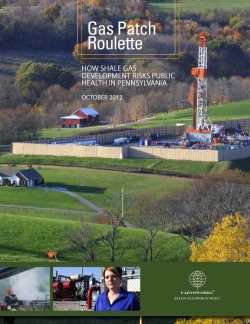Gas Patch Roulette: Full Report
How Shale Gas Development Risks Public Health in Pennsylvania
Published: October 18, 2012
By: Nadia Steinzor, Wilma Subra and Lisa Sumi
The full report's introduction:
Where oil and gas development goes, health problems often follow.
For many people across the United States, this statement has rung painfully true for a long time. As the drilling boom picks up speed and reaches more places, it is now resonating in new communities.From a growing number of stories told by individuals nationwide to conferences held by academics and public agencies, the “dots” between health symptoms and gas facilities are very slowly but surely being connected.
The health survey and environmental testing project described in the following pages is part of this critical process. Between August 2011 and July 2012, Earthworks’ Oil & Gas Accountability Project (OGAP) investigated the extent, types, and possible causes of health symptoms experienced by people living in the gas patches of Pennsylvania.
The findings of this study stand in strong contrast to statements—often made by industry representatives and policymakers seeking to expand drilling—dismissing claims of health impacts as “personal anecdotes” and isolated incidents. Directly impacted people are frequently told that what they experience is a random occurrence and that some other source—traffic, lifestyle choices, family disease history, household products—is to blame.
We know that the gas and oil industry uses toxic substances that harm human health. For example, of about 300 compounds identified as being used in hydraulic fracturing to extract gas, 65 are listed as hazardous by the federal government. In turn, this creates a real potential for negative health effects in any area where gas development occurs. While general scientific links regarding the effects of such exposure have been established, research on the direct relationship between health problems and gas and oil activities has been limited and inconsistent.
Even as knowledge of impacts evolves slowly, gas and oil extraction and production continue to accelerate rapidly—allowing industry to put still-emerging technologies to use without first establishing their safety. State regulations remain too lax and outdated to prevent the impacts of modern-day energy development, and regulatory agencies are often unable to conduct the oversight and enforcement needed to protect air and water quality and, in turn, health and communities. Magnifying the consequences of this situation are special exemptions in provisions of the nation’s bedrock environmental laws, which allow the industry to stifle key information and pursue risky practices.
The overall result is that the burden of proof remains heaviest for impacted individuals and communities themselves. Companies can continue to avoid responsibility and downplay health- related concerns. Decisionmakers can continue to sidestep the need to recognize the damage and hold companies accountable.
Yet the realities, including those described in this report, can be documented—and when they are, they can no longer be denied. When many people in many places where gas development is occurring have similar health complaints, something is clearly wrong. Earthworks believes that when health problems occur, action to solve and prevent them must follow.
For More Information
- Press release
- Gas Patch Roulette: Summary Report
- Full report, high res
- All available information associated with the report, including support documentation not in the full report.
Tagged with: toxics, regulation, public health, pennsylvania, marcellus shale, health and toxics, gas patch roulette, fracking

Follow Earthworks